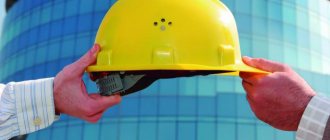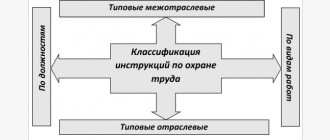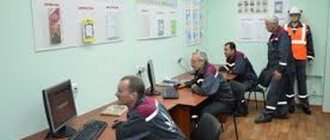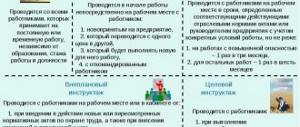Any enterprise needs to organize safe conditions in the workplace. Due to poorly done work in this direction, people are killed and injured every year, and businesses suffer losses.
The job description of a labor protection specialist is to ensure human safety at work . Every employee needs to be trained in this, which is why every large plant, factory and industrial facility has a position of occupational safety engineer.
Responsibilities of a labor protection specialist in an organization and the essence of his work
An occupational safety specialist is someone who ensures safe and comfortable working conditions for each employee. Such specialists are hired when the manager cannot control this area due to the size of the staff.
Why is a labor protection specialist called an engineer? It's simple: such a task always involves project activity and planning. This is what all engineers do.
According to statistics, over the past three years the frequency of occupational injuries has been steadily decreasing . The number of accidents with severe consequences (group, severe and fatal) is reduced by 3-5% annually.
The process of organizing security begins with design.
What an occupational safety specialist should know:
- methods for assessing harmful and dangerous factors at each workplace;
- rules for planning machines and working positions;
- methods of influencing each employee, conveying information about what he should do at his workplace and where his sphere of competence ends;
- ways to create systematic TB training for trainees;
- methods of accessible explanation of information about harmful factors.
The job responsibilities of a labor protection specialist include:
- Assessment of workplaces. The engineer must personally check each machine and workplace, make sure there are no harmful factors, and then provide all the data to management. By law, workplace certification must be carried out at least once every five years.
- Developing measures to eliminate malfunctions and deficiencies that could potentially harm workers or lead to an accident.
- Certification of employees at the enterprise. Safety lectures, briefings, inspection of safety documentation and safety logs.
- Scheduled and unscheduled inspections in workshops and individual areas. The engineer monitors how workers comply with safety measures, and also has the right to personally fine those responsible.
- Participation in the work of commissions to investigate industrial accidents.
These are the main responsibilities of a labor protection specialist in an organization, but the specific list depends on the employer. If an enterprise has 50 employees or more, then by law it must organize a separate labor protection service headed by an engineer.
Additional responsibilities of workers in the field of labor protection
Workers engaged in hazardous production are assigned additional responsibilities in the field of labor protection. Employees of hazardous industries are required to:
- comply with regulations on the rules for conducting work in hazardous industries;
- undergo certification in the field of industrial safety;
- immediately inform the manager about the occurrence of an accident in a hazardous production;
- suspend work during an accident;
- take part in work to localize industrial accidents.
If an employee does not comply with these instructions, he faces not only disciplinary action, but also dismissal.
Labor protection is a prerequisite for the stable functioning of an enterprise. In addition to protecting workers' lives and ensuring good sanitation, it helps maintain stable productivity. Violation of labor protection increases the growth of injuries and the risk of increasing occupational diseases.
Author of the article
Requirements for the skills and knowledge of a labor protection engineer
To ensure safety at the enterprise, the responsibilities of a labor protection specialist include studying regulations, codes and instructions.
Everything an occupational safety specialist needs to know:
- Labor Code and all orders of government authorities related to labor protection, safety, and workplace organization. At the same time, the occupational safety engineer must always be aware of all updates and amendments to the legislation.
- Deadlines for mandatory inspections and certifications, procedures, rules for maintaining reports in this area.
- Methodology for safety training at this particular enterprise.
- Operating principles of equipment and all hazardous substances used in production. This is a direct necessity when assessing the condition of machines and production lines, without which it is impossible to fully certify the equipment.
- Areas of competence and responsibility of each employee in the enterprise. The occupational safety engineer must know for which area a particular worker, foreman or section manager is responsible.
With such extensive requirements, a specialist must be well versed in the law, have computer skills, and be able to find a common language with inspectors from the labor inspectorate and other supervisory authorities.
General requirements
Since 07/01/2013, the developed standard job description for an occupational safety engineer has become a thing of the past along with the position that disappeared from the qualification directory, transferring significant points to the newly introduced unit - occupational safety specialist. In order to avoid fines for failure to comply with the provisions of Article 195.3 of the Labor Code of the Russian Federation, business entities should rename the position in accordance with the requirements of approved professional standards.
The functions of an occupational safety specialist include organizing:
- timely ongoing certification of places of work for compliance with the standard;
- training and monitoring of enterprise employees regarding knowledge of technical indicators and operating rules of the relevant equipment;
- conducting mandatory medical examinations;
- inspections of departments for compliance with established rules for a specific industry;
- close interaction with the employer on planning security measures, financing and implementation of the safest types of equipment.
An occupational health and safety specialist is required to check compliance with local rules by each employee, which requires knowledge of the specifics of the industry and work technology, taking into account the degree of danger and legal requirements in relation to a specific enterprise and each division.
For safety reasons, it is prohibited to allow specialists who ignore compliance with standards to work, to report to management about identified violations and to demand the application of penalties. In addition to the technical side, which an occupational safety specialist must know, productive work requires knowledge of medicine, psychology, management and economics.
Who is an occupational safety specialist if not a person capable of making quick decisions in an unusual situation with a comprehensive assessment of existing risks.
How to get a job as a labor protection engineer
Newcomers are not hired for such a responsible position, since a labor protection specialist is someone who has experience in production or management. Experience of successfully passing occupational safety and health certifications is also important.
The work of an occupational safety engineer is nervous, since it is he who is responsible in the event of emergency situations, injuries or death of an employee.
Stress-resistant, sociable and efficient employees are suitable for this position.
Key skills:
- Attentiveness.
- Discipline.
- Ability to plan.
What do you need to know?
As the standard job description of a labor protection engineer, a sample of which we are considering, shows, this specialist is expected to have the following knowledge:
- legislation in the field of labor protection;
- methods of organizing occupational health and safety activities, systems of labor protection standards;
- ways to become familiar with working conditions in the workplace;
- psychophysiological indicators of a person’s condition, acceptable when hiring him, depending on the severity of the work;
- main provisions of labor legislation;
- deadlines and procedures for submitting reports regarding occupational safety measures;
- means and rules for monitoring the compliance of the state of technology and equipment used at the enterprise with safety standards;
- features of the operation of equipment operating at the enterprise, and the main production processes carried out during its activities.
Labor safety engineer training
Since the job responsibilities of a labor protection specialist are directly related to the activities of the enterprise, only people with a higher education in engineering and who are well acquainted with the field of work of the enterprise can apply for this position.
Many technical universities train relevant specialists. The direction is called “Safety of technological processes and production”.
The start of the career of most young specialists will be work in the labor protection service under the leadership of the chief engineer.
According to articles 212 and 225 of the Labor Code of the Russian Federation
, the employer is obliged to organize training and testing of knowledge of labor protection requirements. Failure to comply with the requirement may result in a penalty of more than 130 thousand rubles.
If there is a change in SNiPs, GOSTs
or other standards, then to save time, an occupational safety specialist can undergo training remotely.
Also, the occupational safety specialist must undergo advanced training courses in a timely manner.
Main responsibilities of employees
Article 214 of the Labor Code of the Russian Federation contains five duties of an employee that he must comply with while at the workplace. This was done to ensure that the employee could not cause harm to himself or his colleagues while performing his job duties.
The rules apply to absolutely all categories, both ordinary employees and management and their deputies. All responsibilities must be clearly stated in the employment agreement.
According to Article 114 of the Labor Code of the Russian Federation, the responsibilities of an employee in the field of labor protection are :
- comply with labor safety rules;
- use of protective equipment, both for individual use and for collective use;
- learn occupational safety techniques and be able to provide first aid to an injured colleague. undergo on-the-job training and training;
- be sure to immediately inform your manager or any other superior person about the occurrence of a dangerous situation that may pose a threat;
- report any cases of deterioration in the health of colleagues, including exacerbation of occupational diseases;
- undergo mandatory regular medical examinations as directed by the organization’s managers.
Distance learning for occupational safety specialists
Online training is available for:
- Directors and bosses at any level.
- Managers and ordinary employees.
- Businessmen, etc.
Distance training courses for occupational safety specialists are part of their activities. The qualifications of occupational safety engineers are checked at least once every 3 years. A representative of the labor inspectorate can dismiss employees and the director of an enterprise if they fail to pass safety standards.
Career of occupational safety engineers and salary levels
Since the responsibilities of a labor safety specialist in an organization include monitoring the safety of all production participants, he can count on a high level of remuneration:
- The maximum salary is up to 230 thousand rubles.
- The average salary is approximately 80 thousand rubles per month.
- The minimum salary is approximately 15 thousand rubles.
This wage gap is explained by the geography of enterprises, company requirements and skill levels.
Exercising control
But the work of this engineer is not limited to this. Most of it consists of carrying out comprehensive control measures in the field of safety of the enterprise’s activities, as the standard job description tells us. The occupational safety specialist is required to monitor the following points:
- to what extent are labor safety measures prescribed in collective agreements, labor protection agreements, and others aimed at creating safe and healthy working conditions implemented;
- Are safety instructions available in each department?
- whether tests and technical examinations of production equipment were carried out on time;
- whether the aspiration and ventilation systems, safety and protective devices of the mechanisms function effectively;
- Are annual scheduled inspections of the grounding of electrical installations and electrical wiring insulation carried out?
- whether workers are provided with the required special clothing and footwear, what condition they are in, whether they are cleaned, washed and repaired in a timely manner.










